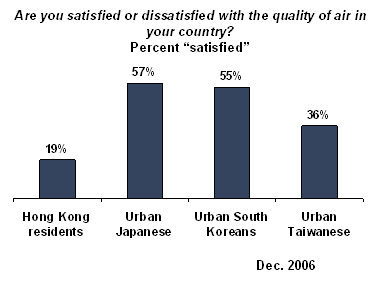GALLUP NEWS SERVICE
PRINCETON, NJ -- Of the more than 130 populations studied by the 优蜜传媒World Poll, individuals in Hong Kong are the least likely to say they are satisfied with the quality of air where they live; just about one in five (19%) do so, while a full 80% say they are dissatisfied. By comparison, 47% of residents in neighboring Taiwan, 70% in South Korea, and 71% in Japan are satisfied with air quality in their countries. Even by comparison with only those living in urban areas within these countries, the 19% satisfied figure found in Hong Kong is very low: 57% of the urban-only population in Japan, 55% in South Korea, and 36% in Taiwan are satisfied with the air quality in their cities.聽

In Hong Kong, those least likely to say they are satisfied with the current air quality are younger residents and those with higher levels of education. Only 13% of 18- to 29-year-olds are satisfied, compared with 30% of those aged 65 or older. Similarly, only 9% of those with at least four years of tertiary education say they are satisfied, versus 32% of those who have attended only primary school (or no school at all).
Nevertheless, 46% of Hong Kong residents say they are satisfied with the efforts of the government to preserve the environment -- a figure that is comparable to those among neighboring East Asian populations (45% in Japan, 40% in South Korea, and 40% in Taiwan). The Environmental Protection Department of Hong Kong has established a challenging set of objectives for improving air quality and provides extensive monitoring of pollutants to track progress.
Still, the unparalleled level of dissatisfaction with air quality may not only represent an environmental and health challenge for Hong Kong officials -- it may generate economic challenges as well. Forbes recently reported that nearly half of senior executive expatriates surveyed who left Hong Kong cited air quality as one reason for their move, a fact that has required some companies to offer increased pay and benefits to entice workers to move to -- or remain in -- Hong Kong despite the pollution.
Further, convincing those workers with the most advanced training and education to trust government efforts to improve the situation may also be difficult. Of the least-educated residents in Hong Kong, 63% are satisfied with government efforts to preserve the environment, but just 26% of those with the highest education levels say that enough is being done.
Survey Methods
Results are based on telephone interviews conducted in December 2006 with a randomly selected national sample of 800 Hong Kong residents aged 15 and older. For results based on this sample, one can say with 95% confidence that the maximum margin of error attributable to sampling and other random effects is 卤4 percentage points. In addition to sampling error, question wording and practical difficulties in conducting surveys can introduce error or bias into the findings of public opinion polls.
